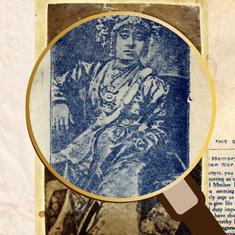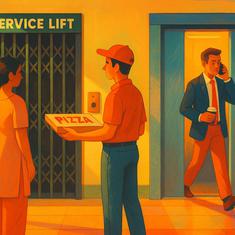“Mummy, look at the road,” Devin says.
“Yes, boss.”
“Drive with two hands.”
Neja chuckles for his amusement. “You’re a little tyrant.”
“T-I-R-A-N-T,” he says. “Tyrant.”
“Not quite, but close enough.”
“Close enough isn’t good enough. Watch that dog, Mummy. This isn’t a race.”
“You sound like your grandmother.”
Devin lifts his chin to mimic Loku Madam. He looks out of the window and relaxes enough for his own propensity to speak a lot of nonsense to knock himself out as he falls asleep. Neja passes through the tollbooth on the other side of the expressway, and Google Maps directs her to a road that bisects a paddy field. She notices movement in her rear-view mirror. Devin pushes himself upright, his face pressed against the window.
Neja’s phone vibrates. Her glances shift between the screen and the road. Not the time to answer. Devin is nosy and observant.
“You look tired, Mummy,” he says. “We can go home if you like.”
Neja knows her boy. He is scared of everything he has not done before. Wanting to go kayaking is about confronting those fears. A middle finger to the bullies who called him a chicken for not going on the class trip. But now he must be having second thoughts.
“We’re almost there now,” Neja says. “The sun’s out.”
“But, Mummy, if you’re tired, we can go home, and I’ll be quiet while you and Daddy Netflix and chill.”
“Don’t say that.” Neja laughs. She can’t explain that it does not mean, as Ramesh claims, watching television with the air conditioner on.
Her phone rings again. The sound is off, but her Bluetooth isn’t, so Johnny’s unsaved number shows up on the car’s display – something she didn’t notice the first time he called. Neja waits till it rings off. It rings again. She ignores it again. But she is getting sleepy. She couldn’t have gotten more than a couple of hours of drunken sleep the night before. She slaps herself about a little and lowers all the windows, hoping to be stimulated by the smoky, sweet smell of cinnamon as they pass by a plantation, but there is nothing except the aroma of rainwater drying off asphalt, with the occasional hint of cow dung.
“What’s that, Mummy?” Devin asks as Neja slows down in the face of a barricade of sticks and a potted plant. There is a piece of cardboard hanging from what looks like a crucifix made from tied-up bamboo. On the cardboard, in black biro, there are letters, each line thickened by multiple strokes. It says, “Turn here. Road works ahead.”
The last thing Neja needs is a detour. She needs the loo. She needs water. She needs to close her eyes. First, she makes the turn, driving up a steep, half-finished road laid with loose stones.
She slows the car enough to cut Johnny’s seventeenth and eighteenth calls. She opens WhatsApp. There are thirty messages from Johnny Dias, but Neja feels Devin looking over her shoulder.
She glares into the mirror and down at her phone. Johnny’s first message says: Don’t go to the river. Not safe. The next one says: Come back to Colombo, urgently.
Neja’s heart rate elevates, her head pounds. What’s going on? Is Johnny desperate to see her? She wants to read more, but Devin is leaning as far forward as his seat straps will allow. She fumbles with her phone till it drops to the floor, her eyes following it. She presses on the accelerator.
“Stop, Mummy, stop.”
Neja has no idea what happens in that moment. Her foot jams on the brake. In front of the car is a male figure, wearing a bucket hat, using a half crutch to beat a woman in hijab, who is holding the handle of a pram with one hand, defending herself with the other. Neja’s phone vibrates against her foot, but this time, she doesn’t look for it. Her eyes are locked straight ahead. The man in front of the car is trying to pull the woman’s hijab off.
“Close the windows, Mummy!” Devin shouts. “Close the windows!”
Looking ahead, Neja doesn’t answer. She watches the woman strike the man, but he brushes her off like swatting away a fly. He wrenches the woman’s hands off the pram. Whacks her across the face with a closed fist.
“The baby!” Neja shouts.
The pram is rocking its way down the hill, gathering momentum. The woman in hijab lies face down on the dirt track. Kicking her legs, screaming, “My baby!” This is like out of a movie. Slow motion, grainy.
But this is no movie. The baby will die if someone doesn’t stop the pram from rolling off the side of the hill.
“Wait here.”
“But, Mum…”
Kicking open her door, Neja stumbles down the road. Within a few metres of the pram, she dives for the handlebars. She misses.
Back on her feet, she looks down at her knees, and everything slows down. The blue of her jeans is browned by the dirt, and it blotches blood-red from the inside. The pram has come to a natural stop against a large rock. Neja staggers towards it. Calls to the baby. Why is he or she not crying? Neja’s legs battle forward in small steps. She gets to the pram. Bends down to look into it.
There is a pillow. There is a sheet. There is a baby with a doll-like face, round, open mouth.
Not a baby. A doll.
A doll in the pram instead of a baby.
“Devin. Devin. Devin.” Neja spins on her heels, looking back towards the car, at least thirty metres away now. She trips but catches herself. “Devin, Devin.”
The black roof of the BMW comes into view. The back-left passenger door is open, but it should be child-locked, so Devin can never get out without help.
Neja’s ribs contract around her organs. A block in her lungs. In her heart. She can’t breathe.
All else is still.
No man in a bucket hat. No woman in hijab.
The world is on pause, except for Neja.
And she knows before she sees.
Devin is gone.

Excerpted with permission from A Hiding to Nothing, Chhimi Tenduf-La, Hachette India.










